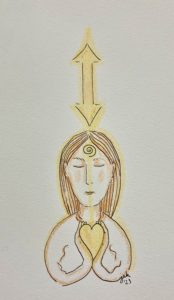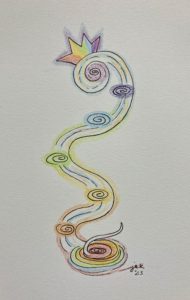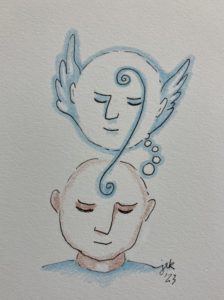
-Illustration © 2023 Jan Ketchel
Life in a physical body upon the Earth, at this phase of eternity, is largely governed by autosuggestions emanating from our instinctive nature. Though consciousness is awakening to its power to intend and create its physical reality, it remains largely controlled by hidden, limiting autosuggestions.
Autosuggestions can originate from both conscious and subconscious intent. The ego, employing its thinking mind, can decide upon an innovative change that it then perseveringly suggests to its workhorse subconscious mind to manufacture in material reality. This is an example of a conscious intent derived from inductive, or creative, thinking and presented to the subconscious mind for materialization.
The subconscious mind does not employ the inductive reasoning of ego consciousness. With inductive reasoning the ego can think and create outside the box. Though I have stated repeatedly that the subconscious does not think, this is in fact not completely accurate. The subconscious thinks deductively.
Essentially, the subconscious treats the suggestion it embraces as absolute fact and engages all of its energy to manufacture and prove this commanding suggestion via associations generated from its access to the vast storehouse of human evolutionary history. Thus, the subconscious makes a suggested truth become a physical truth.
Although the conscious mind, particularly through perseverance, can attract the subconscious mind to embrace and manufacture its suggestions, the subconscious mind is mostly drawn to suggestions presented to it by our genetic code, our evolutionary history and, most prominently, our instincts, which have insured the survival of the human race.
If the conscious mind imagines it will be attacked in some way, fear might overtake one’s mental, emotional, and physical state. Confronted with actual danger, the subconscious mind will likely embrace and act upon instructions suggested to it by one’s self-preservation instinct, which can result in the calm clarity and superhuman strength needed to defend one’s self. In this case, the subconscious abandons the suggestion of consciousness, to remain fearful, in favor of the empowered instinctual suggestion to survive.
This overtaking of the ego by autosuggestion from the instinct for self-preservation is favorable in this instance, as it can save a life. However, a family history of a particular disease, rooted in one’s genetic code, might pose the suggestion to the subconscious to automatically activate this latent possibility of disease. This situation may be further complicated by a reigning blocking belief in science, which states that consciousness alone cannot alter physical reality. Consequently, the ego is sheepishly lulled to concur with the disease suggestion of its genetic code, thereby forfeiting its potential ability to create another reality.
To be sure, not all physical conditions can be altered by conscious suggestion. Some programs, such as the inevitable death of the human body, derive from programs that may be delayed but ultimately cannot be overcome.
But clearly, evolution advanced us from the total domination of our animal instinctual mind, to allow for free will and change, because of the creative power of consciousness to alter physical reality and thereby enhance its potential for survival. This is evolutionary innovation via intent versus via natural selection. The golden opportunity of now is to fully embrace and exercise this creative power of mind for the greater good of all.
Advanced disembodied souls, whom have turned their attention to informing and guiding those of us still physically embodied, have shared consistently that life beyond the human body is primarily controlled by the soul’s mental capacity to imagine. Imagination is the currency of nonphysical reality, where one is freed to live in a reality of one’s own mental construction.
This creative activity allows a soul to generate familiar environments, populated with kindred souls, enabling the completion of incomplete residual dreams from one’s prior sojourn in physical life. Completion, at this phase of eternity, enables one to progress ultimately into the more expanded dream of one’s soul group.
This refinement of creative imaginative power, beyond physical life, though largely dormant while living in a physical body, is nonetheless a latent power capable of being activated while in physical life. The shamans of ancient Mexico instruct us to suspend the prejudice of materialism and unrelentingly intend the change we seek. With intent we can awaken the spirit from its slumber in materialist malaise.
To support this awakening, the shamans also recommend that we throw out a line and hook to our future disembodied soul state, and to the prolific potential of this creative facility, stalking it now. By stalking, the shamans mean embodying the full knowing and exercise of intent as the prime creative power in life. To consciously master it in this life is the ultimate intent.
Trust the power of the Spirit. Trust the power of consciousness to change the self and to change the world.
As we live through the destruction of this Fall season of Earth’s life and face the inevitable changes ahead, let us, without fear or doubt, imagine and create, with intent, a new world that reflects the greater good for all.
Without attachment to the outcome, know it will be done. This is the golden opportunity of now.
Imagine,
Chuck




